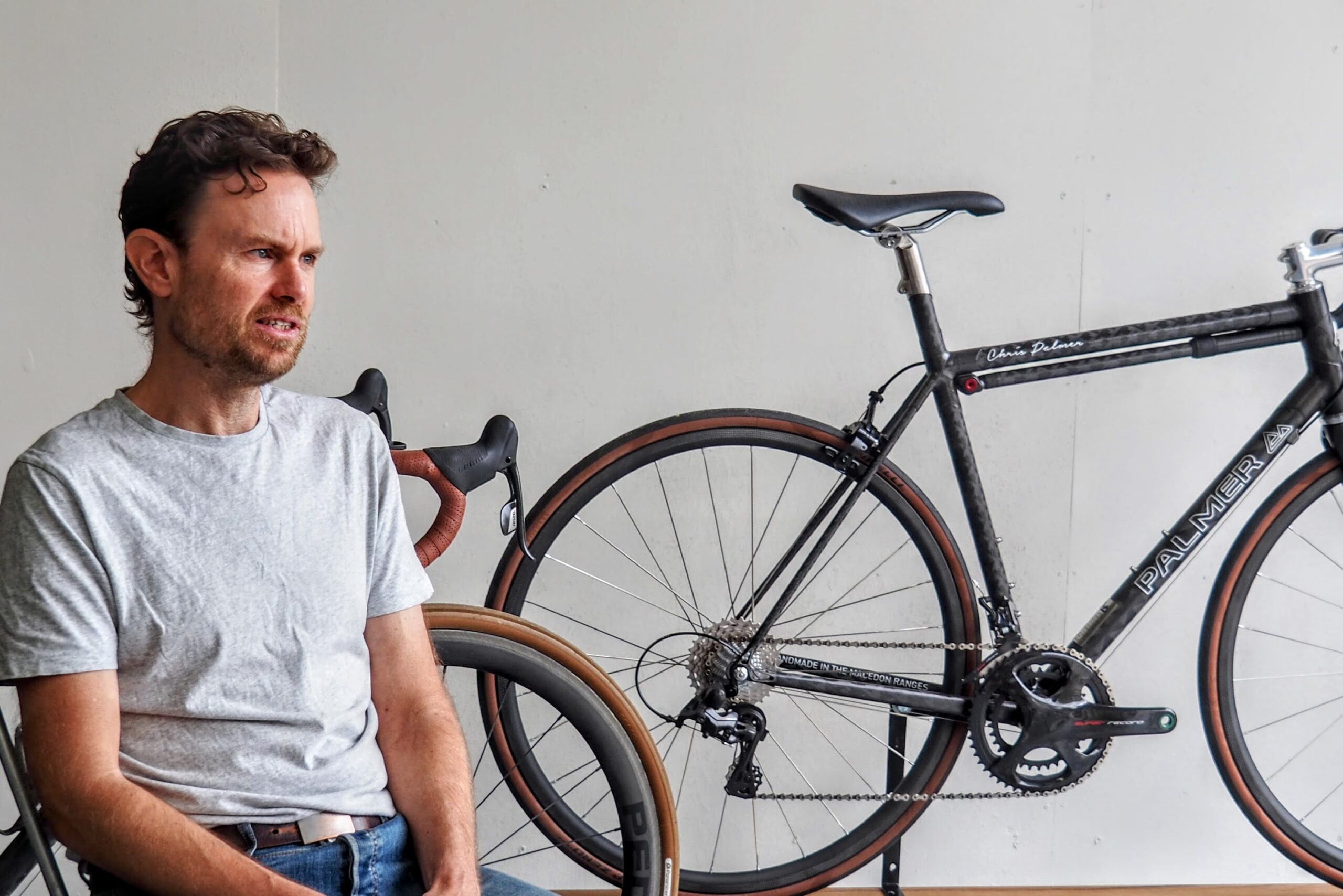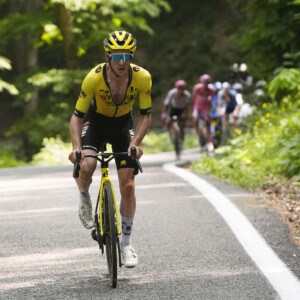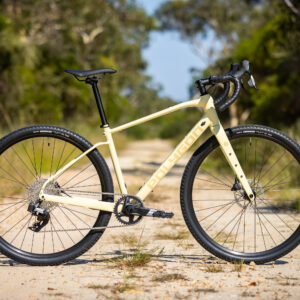Handmade bikes are being built in workshops across Australia by frame builders who you’ve probably not heard of. Alison McGregor shared her insights.
When you imagine the world’s most revered custom bikes, your mind might drift to the foothills of Italy, to builders like Gianni Pegoretti or Cicli Barco who’ve built reputations on generations of craftsmanship. Or perhaps to the States, brands like Firefly Bicycles, Moots, or Lynskey strike your imagination. But some of the most innovative and high-performance bikes aren’t coming from overseas. They’re being built in workshops across Australia.
From the engineering precision of Mark Hester at Prova Cycles, to Chris Palmer’s intimate rural workshop, to the determined momentum of Sean Doyle at Devlin Bikes, a different narrative is taking shape. One not built on heritage, but on grit, innovation, and the quiet belief that handmade still matters.
This feature draws from time spent inside each builder’s workspace, amid the tools, machines, and decisions that define the rhythm of Australian custom frame building. While each voice is distinct, together, they speak to a shared resilience and resistance: a deliberate counter to the polished uniformity of mass-manufactured cycling.
The rise of the independent builder: trust
Not long ago, especially in the pre-1990s, Australia had a thriving local frame-building scene. Walk into a shop, and your frame might’ve been welded just down the road. But the advent of carbon moulds, standard sizing, and globalised production shifted everything. Factories across Italy, England, and the US were swallowed by the industry’s appetite for mass output.
Today, Australia has around 30 active custom builders. Fewer than five work with titanium or carbon in-house. Most are one-person operations. Many juggle other jobs.
Mark Hester, founder of Prova Cycles, one of the country’s most advanced and internationally recognised titanium and carbon frame builders, knows this challenge well.
“I think one of the biggest hurdles is just trust,” he says. “You’re asking someone to invest several thousand dollars in something they can’t test-ride or see beforehand. That’s tough when they’ve grown up only seeing major brands dominate the conversation.”
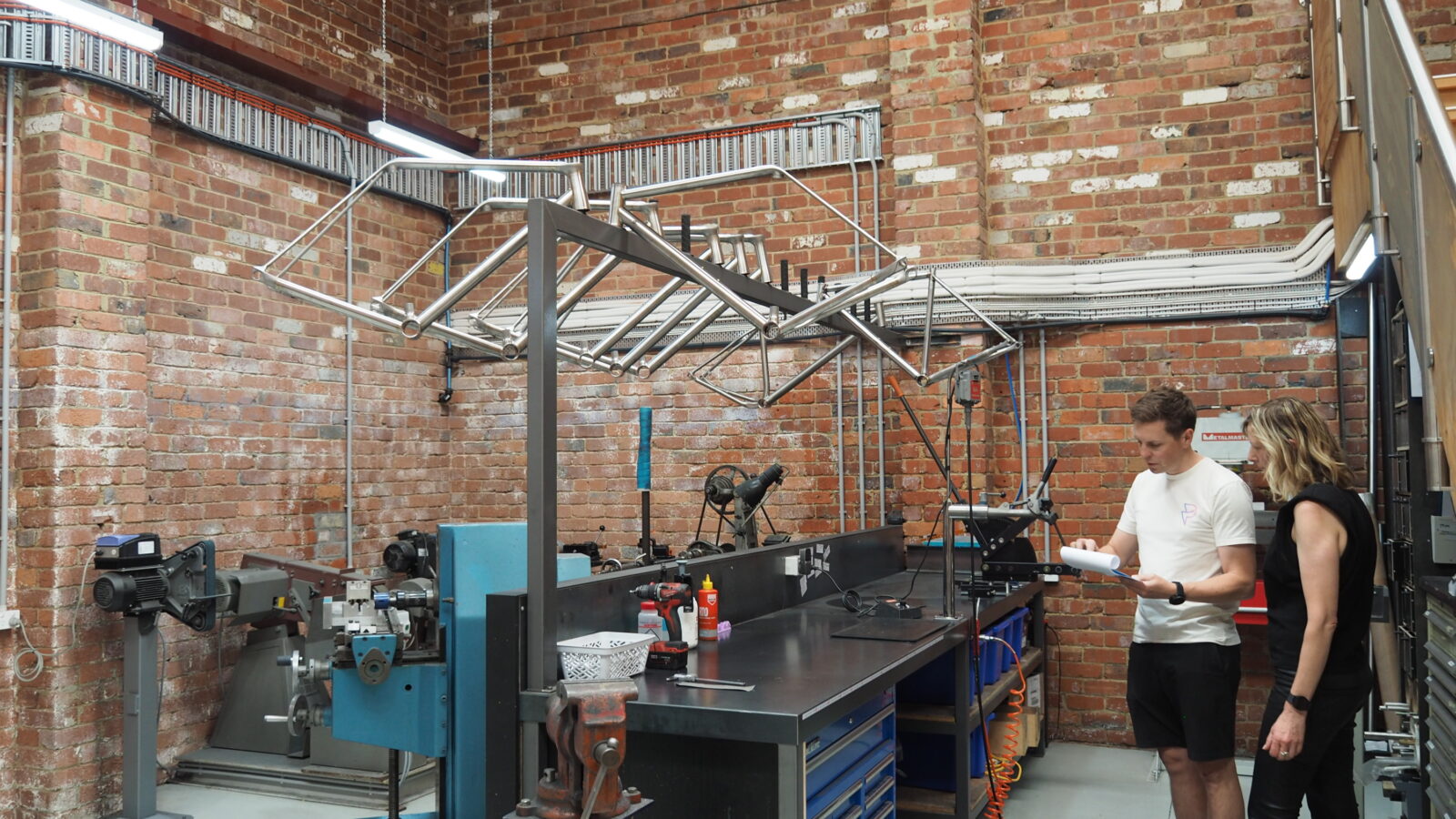
Sean Doyle of Devlin Cycles agreed: “You’re not just building a frame. You’re trying to build a reputation, one rider at a time. And sometimes that rider doesn’t even know this world exists.”
This resurgence in Australian frame building isn’t about nostalgia or aesthetics – it’s about engineering precision and rider connection. Builders like Doyle, Hester, and Palmer are crafting performance machines designed around individual goals: climbing efficiency, gravel endurance, downhill performance, and outright speed.
What they offer, though, is irreplicable: a rider-first process where every millimetre of geometry, tubing, and layup is calibrated for one body. Contrary to perception, handmade doesn’t mean amateur. These are trained engineers – aerospace, automotive, and industrial design veterans who’ve simply chosen to work with a human scale.
“It’s amazing how connected people feel to the product when they’ve watched it go from a box of tubes to a finished bike, and they know who built it,” Hester told me.
Custom bikes made by expert builders remove the guesswork. When a bike is built around your proportions, power transfer, and terrain, the results endure, long past the next product cycle.
That kind of trust isn’t mass-produced. It’s forged slowly, in workshops, through listening, fitting, building, and following through.
Precision, not production: the case for custom
In a world where mass-market bikes are built to fixed geometries, the work of builders like Doyle, Hester, and Palmer feels almost defiant. But this argument would be misleading, because the core of their motivation is focused and simple: to produce incredible frames for individual riders.
Chris Palmer, from his modest workshop in Victoria’s Macedon Ranges, hand-lays carbon plies with surgical precision. With a background in automotive engineering, specifically chassis dynamics, he brings a Formula One-level understanding to frame feel and performance.
“In cars, you’re always chasing that balance – stiffness, compliance, weight distribution – all to give the driver a feel that’s connected and predictable on the road. Bikes are no different,” Palmer told me. “You’re tuning the frame to respond to the rider, not just the terrain.”
To achieve that, he’s built everything himself: compression moulds, CNC cutters, even a frame-sized carbon curing oven. Each layup is designed in CAD, composed of 60-70 carbon plies, and hand-laid to suit the rider’s weight, style, and goals.
While aesthetics draw attention, these builders aren’t romanticising the craft – they’re engineers applying analytical, performance-driven thinking.
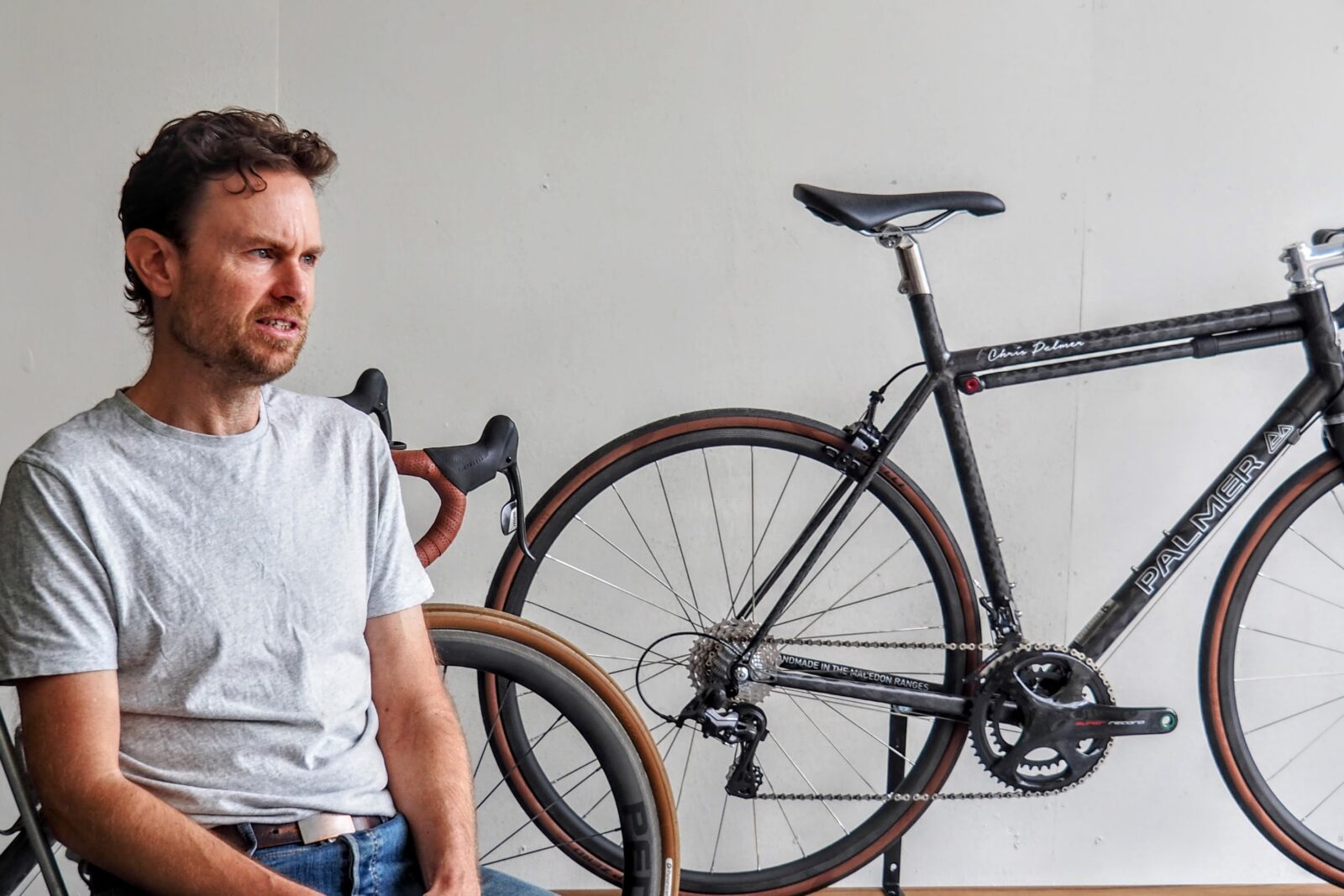
At Prova, Mark Hester brings his aerospace composite background to bear. Structural integrity isn’t assumed – it’s engineered. His use of 3D-printed parts isn’t a novelty; it’s optimisation. His frames are a success not only for their looks but also for their perfect weight balance, future serviceability, and responsiveness.
Proper geometry improves power delivery, reduces injury risk, and enhances endurance. Whether it’s an all-day Alpine climber or a gravel rig that keeps its line through chatter, this is what custom means: not just choosing colours, but defining performance – and having it built around you.
Engineers, riders, craftsmen, and entrepreneurs
What unites these builders isn’t just a commitment to craft – they’re engineers and riders first.
Mark Hester, with a background in automotive composites, spent years at Ford and Honda before taking a frame-building course in the UK, discovered, fittingly, at a bike race.
“I just wanted to build a frame for myself,” he recalls. “Then a couple of friends asked, and it snowballed from there.” When someone outside his city ordered a bike after seeing it on Instagram, Prova Cycles became a full-time pursuit.
Sean Doyle currently juggles engineering work while drawing from a competitive racing past. He gradually shifts to full-time building, having relocated Devlin Cycles to Tasmania, at the base of Maydena Bike Park.
“It’s a double-edged sword,” Doyle said of the move. “You have space and clarity, but also fewer opportunities for collaboration. There’s no one to bounce ideas off. No chance to drop by another builder’s shop to share a jig or talk through an issue.”
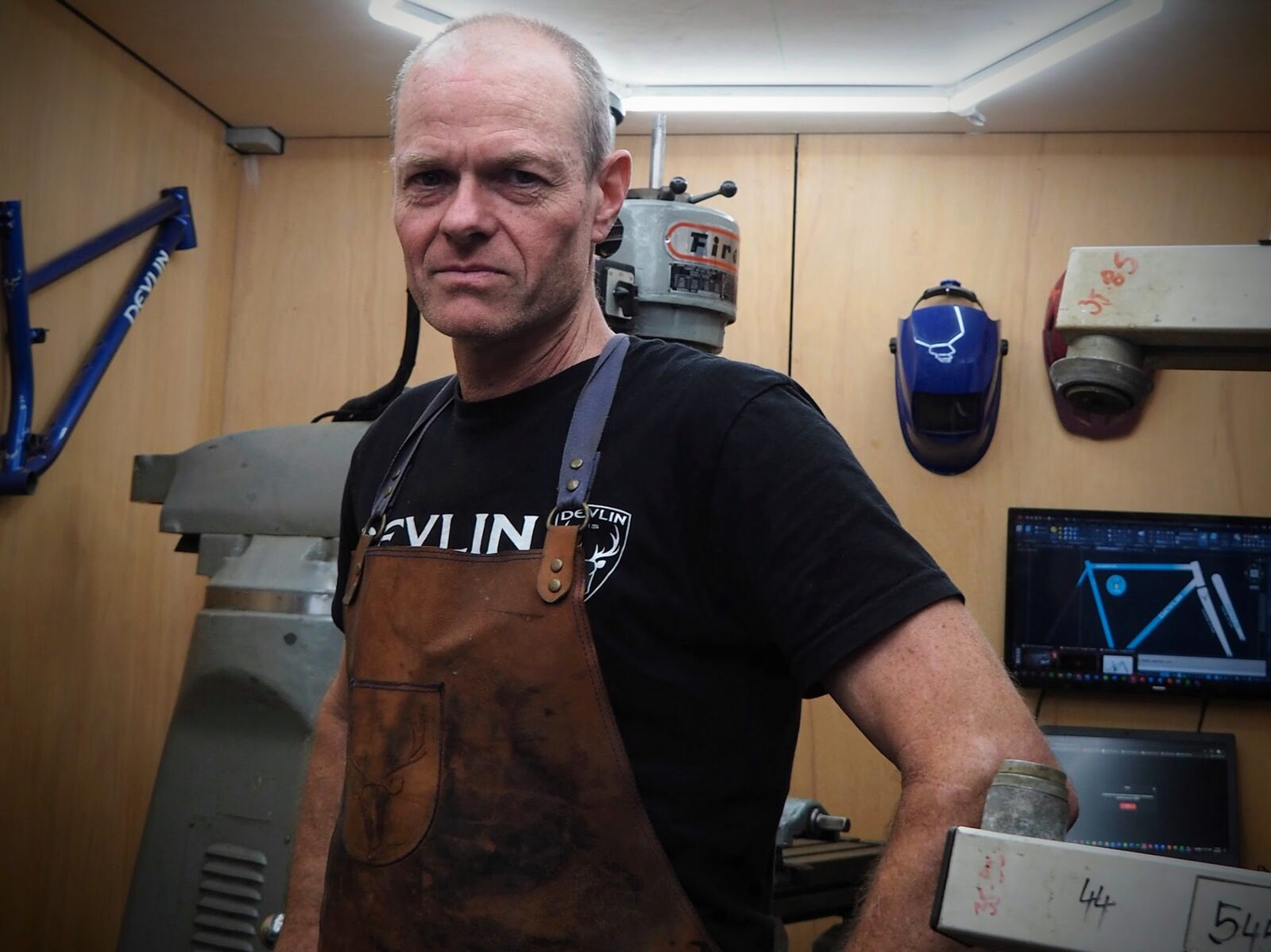
Chris Palmer, too, stepped away from Melbourne’s dense builder community for the quiet of the Macedon Ranges. “Being out of Melbourne is a bit more difficult to grow – being closer to Melbourne’s cycling culture would definitely help to become more known,” he tells me.
Distance from Australia’s major cycling hubs limits visibility, but creates space for innovation. Fortunately, the country’s established builders haven’t pulled the ladder up. Both Llewellyn and Baum are widely credited by emerging builders for offering advice, tools, and mentorship when it mattered most.
First impressions matter, but performance is the core
Chris Palmer understands this well. His meticulous carbon layups aren’t just about structural performance – they’re visual signatures. “It’s the look,” he says when asked what people first notice. Aesthetics draw riders in, spark curiosity, and start the conversation. But it’s the ride – the performance, the fit, the feel – that keeps them engaged.
In a market awash with visual sameness, distinctive design still cuts through. Whether it’s the exposed carbon weave of a Palmer, the raw titanium of a Prova, or the flawless fillet brazing on a Devlin, each builder uses material finish and detail to elevate the experience.
But for every aesthetic flourish, there’s depth underneath. A common misperception is that custom bikes are prized mainly for their looks. For builders like Prova, Devlin, and Palmer, beauty is just the entry point. The real craft lies in how the bike performs – how it climbs, corners, and connects rider to terrain.
The outsourcing dilemma and what riders need to know
As Australia’s custom bike scene grows, some brands are turning to overseas manufacturing to reduce overheads and increase scale. Names like Curve and Bossi are transparent about the shift. Others, less so – obscuring outsourced production behind brand language and polished marketing.
“There’s nothing wrong with outsourcing,” Mark Hester told me. “But it’s not the same thing as building a bike from scratch with your own hands, in your own workshop. That’s a different conversation.”
With builders like Palmer, Prova, or Devlin, the frame isn’t just Australian by name – it’s Australian in process. From initial consultation to final build, each step happens here: fitting, geometry, material selection, welding or layup, communication, finishing, and even component assembly.
This isn’t just a bike. It’s a relationship embedded in your ride and your belief in Australian craft.
The shifting spotlight: where builders stand in a changing industry
It’s an irony not lost on the builders: many Australian riders are more familiar with boutique brands from the US or Europe than those built in their own backyard. When I asked Sean Doyle what success looks like, his answer was telling: “It’s being on the short list for someone’s dream bike. Like, they turn 40, want something special, and they’re considering Baum, Prova… and Devlin. Just to be on that list would be cool.”
It’s a quiet ambition – but a powerful one.
Events like SPOKEN (previously known as the Australian Handmade Bike Builders Show) have long played a vital role in spotlighting handmade talent, connecting builders, riders, and media. The exposure has been invaluable.
Palmer commented, “With robots and AI, the manufacture of bikes could be very different in 10 years. I hope that handmade items will be even more sought after. I aim to straddle that gap – with bikes that perform while retaining a classic style.”
Because what these builders offer isn’t just craftsmanship – it’s proof that cycling can still be personal, local, and deeply human.
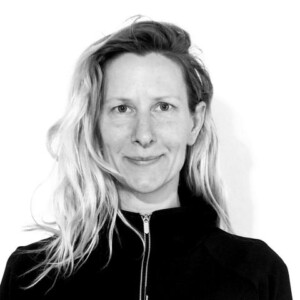
Alison McGregor
Alison McGregor - With over a decade of experience working with Italy’s revered bike companies, Ali is the co-founder of bike shop Chainsmith.
